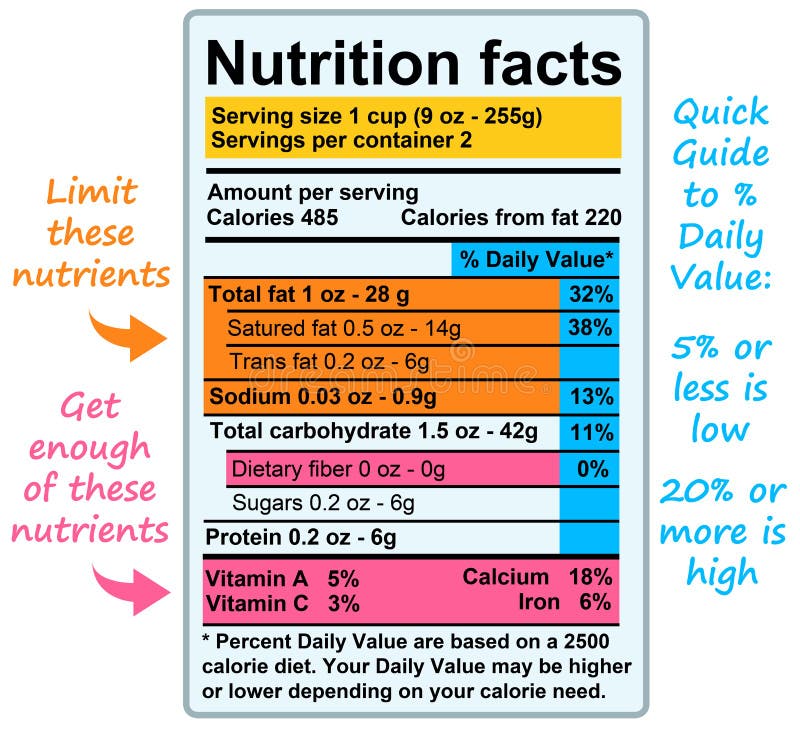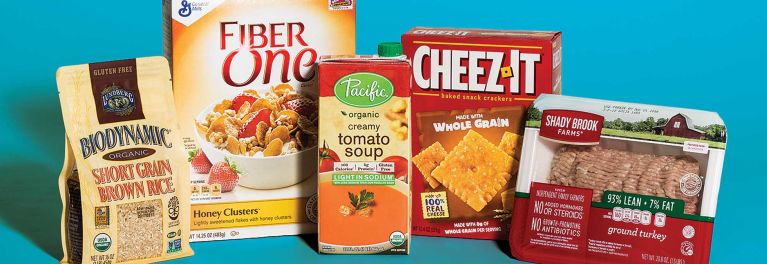43 health claims on food labels australia
About food labels | Health and wellbeing - Queensland Food packaged with a shelf life of 2 years or less must show a date mark. Use by - used for food that must be consumed before a certain date for health and safety reasons. Food with a use by date can not be sold past this date. Best before - used for shelf-stable foods such as biscuits and confectionery, frozen foods, most raw foods that will be cooked before being eaten (e.g. meat ... Labelling Guidance - Australian Beverages Standard 1.2.7 sets out the rules for food businesses choosing to make nutrition content claims and health claims. Nutrition content claims are claims about the content of certain nutrients or substances in a food or beverage, such as 'low in fat' or 'good source of calcium'. These claims will need to meet certain criteria set out in the Standard.
How to understand food labels | Eat For Health Sometimes labels will include nutrition content claims like 'low fat', 'reduced salt' or 'high fibre'. These claims can only be used if the food meets certain criteria. For example, with a 'good source of calcium' claim, the food must contain more than a set amount of calcium.
Health claims on food labels australia
Food and medicine regulation - Therapeutic Goods Administration (TGA) In 2013, a Food Standard (Standard 1.2.7) that sets out rules for the use of nutrition content and health claims on food labels and advertisements became law. It's swallowed and makes health claims - so is it a medicine or food? Generally a product that is swallowed will be either one form of therapeutic good (a medicine) or a food. Health-related claims on food labels in Australia - PubMed Abstract Objective: Health and related claims on food labels can support consumer education initiatives that encourage purchase of healthier foods. A new food Standard on Nutrition, Health and Related Claims became law in January 2013. Implementation will need careful monitoring and enforcement to ensure that claims are truthful and have meaning. Nutrition, health and related claims - Food Standards Health claims You can only base health claims on food-health relationships that have been substantiated according to Standard 1.2.7. All health claims must be supported by scientific evidence to the same degree of certainty, whether they are pre-approved by us or self-substantiated by food businesses. General level health claims
Health claims on food labels australia. PDF Getting Your Claims Right - Food Regulation Food sold in Australia and New Zealand must comply with Chapters 1 and 2 of the Food Standards Code. All food businesses, including importers, in Australia and New Zealand must comply with Standard 1.2.7 when making nutrition content claims and health claims on food labels, in advertisements and in endorsements on food. Organic claims | ACCC An organic claim is any claim that describes a product as organic, or the ingredients used to make a product as organic. For example '100% organic', 'made using organic ingredients' or 'certified organic'. Products labelled as organic generally attract a premium price compared to those produced using artificial fertiliser, chemicals ... Label Claims for Food & Dietary Supplements | FDA Among the claims that can be used on food and dietary supplement labels are three categories of claims that are defined by statute and/or FDA regulations: health claims, nutrient content claims,... HEALTH CLAIMS ON FOOD - Public Health Association of Australia Inc claims on food products was introduced in Australia and New Zealand, in accordance with the fundamental nutrition principle that it is the total dietary balance that is important for health, and not individual foods claiming special medical benefits. 2. This prohibition policy has effectively prevented many
Health-related claims on food labels in Australia ... - Europe PMC Health and related claims on food labels can support consumer education initiatives that encourage purchase of healthier foods. A new food Standard on Nutrition, Health and Related Claims became law in January 2013. Implementation will need careful monitoring and enforcement to ensure that claims are truthful and have meaning. Regulating health claims on food labels using nutrient profiling: What ... Objective: Proposed Australian regulation of claims on food labels includes requirements for products carrying a health claim to meet nutrient profiling criteria. This would not apply to nutrition... How to read food labels | healthdirect In Australia, the law requires all manufactured foods to carry labels containing safety and nutrition information. This information helps you to make decisions about the food you buy and eat so you can follow a healthy diet. The label will tell you: the name of the product, describing accurately what it is. the brand name. Health and nutrition claims | NSW Food Authority Health and nutrition content claims are voluntary statements made by food businesses on labels and in advertising about the health benefits of the food and need to meet the criteria set out in the Food Standards Code. Health claims refer to a relationship between a food and health.
Health & nutrition claims | NSW Food Authority The Food Standard Code contains 200 pre-approved food-health relationships that any health claim must comply with. From January 2016, food businesses must comply with criteria set out in Standard 1.2.7 (Nutrition, health and related claims) for food labels and advertisements. Advertising Compliance and Food Packaging | LegalVision A health claim is one that states, suggests or implies that a food product or a certain property of the food product has, or may have, a health effect. Additionally, businesses can make health claims in their advertising, provided they comply with Commonwealth and state Food Standards legislation, and the claims are true. Health, nutrition and credence claims - food marketing and ... - Lexology The new Standard 1.2.7 - Nutrition, Health and Related Claims regulates the voluntary nutrition and health content claims that food businesses can make on labels and in advertising. The goal of the... How effective is food industry self-substantiation of food-health ... food standard 1.2.7 (the 'standard' hereafter) on nutrition, health and related claims permits three types of claim on food labels: (i) nutrition content claims highlighting the presence or absence of a nutrient, e.g. 'contains calcium'; (ii) general-level health claims stating, suggesting or implying that a food or property of that food has a …
Food labels - Better Health Channel Standard 1.2.7 Nutrition, health and related claims controls the use of content claims on food labels. Nutrition content claims make statements about certain nutrients or substances in a food (for example, 'high in calcium'). For a manufacturer to make various claims, their products must meet various guidelines including:

'A third of the girls with real boobs are considering implants': NFL's oldest cheerleader spills ...
CHOICE guide to food labelling - Nutrition Nutrition content claims and health claims. In 2013, a new standard was introduced to regulate nutrient claims and health claims on food labels. Nutrition content claims are claims about the content of certain nutrients or substances in a food, such as 'low in fat' or 'good source of calcium'. These claims will need to meet certain ...
Nutrition content claims and health claims - Food Standards Health claims are only permitted on foods that meet the Nutrient Profiling Scoring Criterion (NPSC). For example, the Standard doesn't allow health claims on foods higher in saturated fat, sugar or salt. There are 2 types of health claims - general and high level.
PDF Health-related claims on food labels in Australia: understanding ... A new food Standard on Nutrition, Health and Related Claims became law in Australia and New Zealand in January 2013(5). This new Standard sets the rules for the nutrition content and health claims that can be used on food labels and in food advertisements. However, food labels may also carry a wide range of statements that are not covered by ...
Food labelling - Health.vic Food labels must carry essential information, so that consumers are informed of the nature and properties of foods before they buy. Food businesses must ensure that they do not mislead or deceive consumers with any claims made on food labels. Food importers must also comply with Australian labelling laws. All packaged foods sold in Australia ...
Regulating health claims on food labels using nutrient ... - PubMed Regulating health claims on food labels using nutrient profiling: what will the proposed standard mean in the Australian supermarket? The number of products carrying nutrition content claims that did not meet the nutrient profiling criteria suggests that comprehensive regulation is warranted.
What Are The Labelling and Packaging Laws in Australia? As a general rule, all product packaging and labels must comply with the Australian Consumer Law (ACL). The ACL prohibits you from making misleading, deceptive, or false claims on your products. You must also ensure that your product labels comply with any specific laws that apply in your industry, such as the food standards code.
Nutrition content and health claims | Obesity Evidence Hub Australia's Food Standards Code sets out requirements for manufacturers wishing to make nutrient content claims ('low in fat') and health claims ('nuts contribute to heart health') on food labels. Fair trading laws in Australia also require that food labels do not misinform consumers through false, misleading or deceptive representations.
Half a billion animals living a better life as RSPCA celebrates World Farm Animal Day | The Advocate
Health-related claims on food labels in Australia: understanding ... Abstract Objective Health and related claims on food labels can support consumer education initiatives that encourage purchase of healthier foods. A new food Standard on Nutrition, Health and Related Claims became law in January 2013. Implementation will need careful monitoring and enforcement to ensure that claims are truthful and have meaning.
Nutrition, health and related claims - Food Standards Health claims You can only base health claims on food-health relationships that have been substantiated according to Standard 1.2.7. All health claims must be supported by scientific evidence to the same degree of certainty, whether they are pre-approved by us or self-substantiated by food businesses. General level health claims
Health-related claims on food labels in Australia - PubMed Abstract Objective: Health and related claims on food labels can support consumer education initiatives that encourage purchase of healthier foods. A new food Standard on Nutrition, Health and Related Claims became law in January 2013. Implementation will need careful monitoring and enforcement to ensure that claims are truthful and have meaning.
Food and medicine regulation - Therapeutic Goods Administration (TGA) In 2013, a Food Standard (Standard 1.2.7) that sets out rules for the use of nutrition content and health claims on food labels and advertisements became law. It's swallowed and makes health claims - so is it a medicine or food? Generally a product that is swallowed will be either one form of therapeutic good (a medicine) or a food.












Post a Comment for "43 health claims on food labels australia"